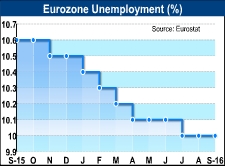
Eurozone unemployment rate remained unchanged for a second straight month in September at its lowest level in more than five years and the number of jobless declined the most in six months, adding strength to the picture of moderate recovery in the euro area.
The seasonally-adjusted unemployment rate was 10.0 percent, unchanged from the previous two months, figures from Eurostat showed Thursday. The figure was in line with economists' expectations.
The latest figure was the lowest since June 2011, when it was at the same level.
The jobless rates for July and August was revised from 10.1 percent originally. In June, the jobless rate was 10.1 percent.
In the EU28, the unemployment rate was 8.5 percent in September, unchanged from a revised rate in August. The figure was the lowest since February 2009.
The number of unemployed in the euro area totaled 16.181 million in September, lower by 101,000 persons from August. The decline was the biggest since March.
Unemployment was 20.79 million in the EU 28, down by 150,000 from the previous month.
The lowest unemployment rates were recorded in the Czech Republic and Germany, while the highest figures were in Greece and Spain. The unemployment rate fell in twenty-four member states.
Youth unemployment, which applies to those under 25 years of age, declined by 243,000 year-on-year in September to 2.88 million in the euro area.
The youth jobless rate dropped to 20.3 percent from 20.6 percent in the previous month and 22.2 percent a year ago. The lowest rate was Germany's 6.8 percent, while the highest was Greece's 42.7 percent.
Figures from the German federal labor agency showed on Wednesday that unemployment reached a fresh record low in October.
Meanwhile, figures released by ISTAT on Thursday revealed that the Italian jobless rate climbed to a seven-month high in September. Elsewhere, data from the Spanish labor ministry showed that unemployment increased in October.
Recent data suggest that the Eurozone is recovering moderately, in line with the projections of the European Central Bank, which pumped considerable stimulus into the economy this year.
The 19-nation economy grew 0.3 percent sequentially in the third quarter, same as in the previous three months, Eurostat reported at the start of this week.
However, economists expect the pace of expansion to ease next year, mainly due to political uncertainties.
"It does seem most likely that unemployment across the Eurozone will fall gradually rather than appreciably over the coming months as Eurozone growth is relatively lackluster," IHS Global Insight economist Howard Archer said.
"We suspect that heightened political uncertainty could weigh down on business confidence and employment in 2017."
Inflation is also accelerating, hitting a high in over two years, thanks to a slower fall in energy prices.
"The latest labor market indicators support our view that the euro-zone recovery is losing steam and that the ECB has a lot more work to do if it is to stand a reasonable chance of hitting its inflation target in the medium term," Capital Economics economist Jack Allen said.
by RTT Staff Writer
For comments and feedback: editorial@rttnews.com
Business News
